1. What is Commercial Glass Recycling?
Commercial glass recycling is the process of collecting discarded glass items from businesses and transporting them to a processing facility. There, the glass is sorted, cleaned, crushed, melted, and reshaped into new products.
Many sectors generate commercial glass waste, including:
- Restaurants, bars, and takeaways
- Hotels and other hospitality venues
- Event spaces
- Breweries and wineries
- Art studios
- Construction and demolition companies
- Automotive repair shops
- Electronics retailers
- Medical and cosmetic facilities
Common items include wine and beer bottles, drinking glasses, jam jars, building materials, electronic screens, and more. In most cases, these can be collected and sent to a recycling facility.
It is important to note that commercial glass waste is different from industrial glass waste. Industrial glass waste arises during the manufacturing process, such as when glassware, windows, or other products are damaged or defective during production.
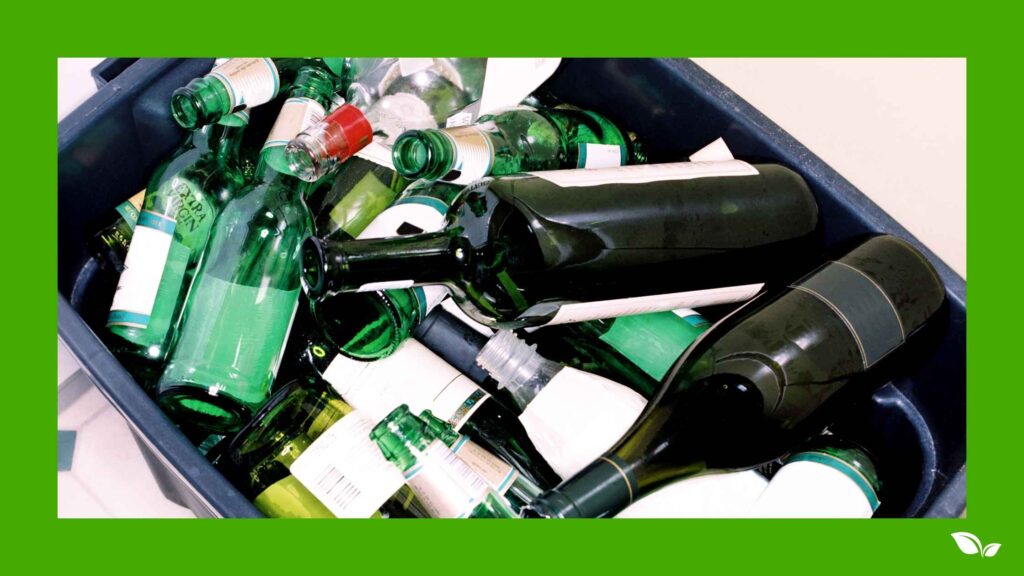
2. Why is My Business Generating Glass Waste?
Glass waste is not about breakages, though. Over ordering, swapping items for a fresh look, or replacing products to improve efficiency can all add up. Certain industries naturally generate more glass waste, food, and drink businesses, for example, use loads of glass bottles, jars, and glassware every day.
Typical sources of commercial glass waste include:
- Glass bottles (wine, beer, soft drinks, milk, water)
- Glassware (wine glasses, champagne flutes, drinking glasses)
- Beverage dispensers
- Condiment containers
- Jars (jams, marmalades, marinades, and general storage)
- Candle holders
- Cooking utensils (roasting trays, microwave-safe plates)
- Glass ashtrays (in places where smoking is still allowed or older establishments)
1. Construction & Demolition
The construction and demolition industry creates a huge amount of waste, and glass is a key part of that. From new builds to renovations, glass materials are constantly being used, replaced, or discarded.
Here are some examples of the types of waste that are produced by the construction industry:
- Windowpanes
- Glass Doors
- Glass Railings
- Broken Glass
- Glass Offcuts
Even small pieces, like offcuts, add up quickly, which is why efficient recycling is so important in this sector.
2. Electronic Stores
Electronic stores that might sell electrical components or electrical products or offer a repair service generate large amounts of glass recycling.
E-waste is becoming a large environmental issue, with large volumes of e-waste also having glass components.
Globally 65.5 million tonnes of e-waste are produced each year, making soil content extremely toxic and contaminating water supplies. 50+ E-Waste Statistics 2025 – DTP Group
Here are some examples of the type of glass recycling that the electronics industry produces:
- Screens (from mobile phones, tablets, monitors, televisions etc.)
- Lenses (from digital cameras or built-in cameras on mobile phones and tablets)
- Monitors (old computer monitors or TV screens that need to be replaced)
- Glass Components (for electronic devices like cameras)
- Glass Fibres (such as those used in fibre optic cables)
- Photovoltaic Panels (also known as solar panels)
3. Medical & Cosmetic Facilities
Medical and cosmetic businesses produce a significant amount of glass waste, and incorrect disposal is common due to uncertainty over what can be recycled.
Typical types of glass waste include:
- Lenses on Microscopes
- Microscope Slides
- Glass Vials, Beakers and Ampoules
- Packaging, Containers & Bottles (for perfumes, lotions, serums)
- Pipettes
- Single-Use Items (such as petri dishes)
Items classified as hazardous, such as sharps or chemical containers, require specialised handling. Efficient recycling systems help facilities manage glass safely, reduce environmental impact, and stay compliant with regulations.
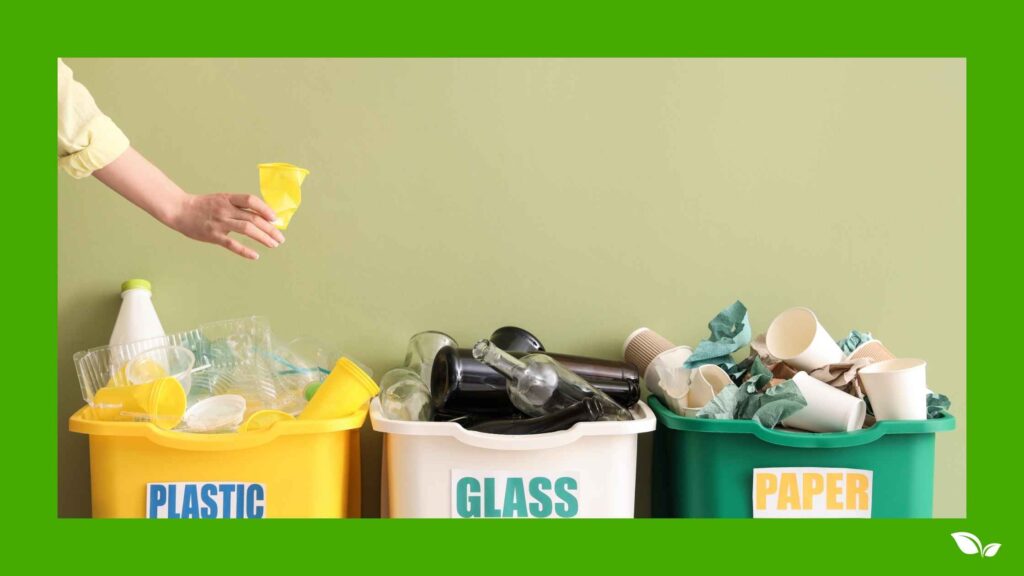
3. Is Having a Glass Recycling Bin Mandatory for My Business?
A dedicated glass recycling bin for hotels and other hospitality businesses, is a legal requirement if you produce significant glass waste. But offers multiple benefits for both your company and the environment.
1. Cost Savings
Using a glass recycling bin can reduce the weight going into general waste or dry mixed recycling, lowering the size or frequency of those collections, and saving money.
Recycling glass is more cost-effective than sending it to mixed recycling streams, meaning your business can make significant savings while managing waste efficiently.
2. Environmental Impact
Recycling glass has a strong positive impact on the environment:
- Energy savings (One ton of recycled glass saves forty-two kilowatt-hours of energy, seven hundred pounds of carbon dioxide from being released in the atmosphere.) How Does Recycling Save Energy? | Greentumble
- Landfill reduction (Glass in landfills can take up to a million years to decompose.
Recycled glass is reused in a variety of applications, from new bottles and jars to tiles, countertops, flooring, and even concrete, supporting a circular economy and reducing landfill waste.)
3. Compliance with Legislation
Your business has a legal responsibility to keep waste to a minimum and do everything possible to prevent, reuse, recycle or recover waste.
The Environmental Act, which became law in 2021, establishes legally binding environmental improvement targets for businesses. This legislation applies to all businesses across the UK, including hotels, bars, restaurants, and other hospitality venues.
If your business produces significant amounts of glass waste, such as wine bottles from your bar, glass jars from your restaurant kitchen, or glassware from housekeeping operations, having a dedicated glass recycling bin is mandatory. Clear separation of glass from other waste streams is required by law and ensures your business remains compliant with UK waste regulations.
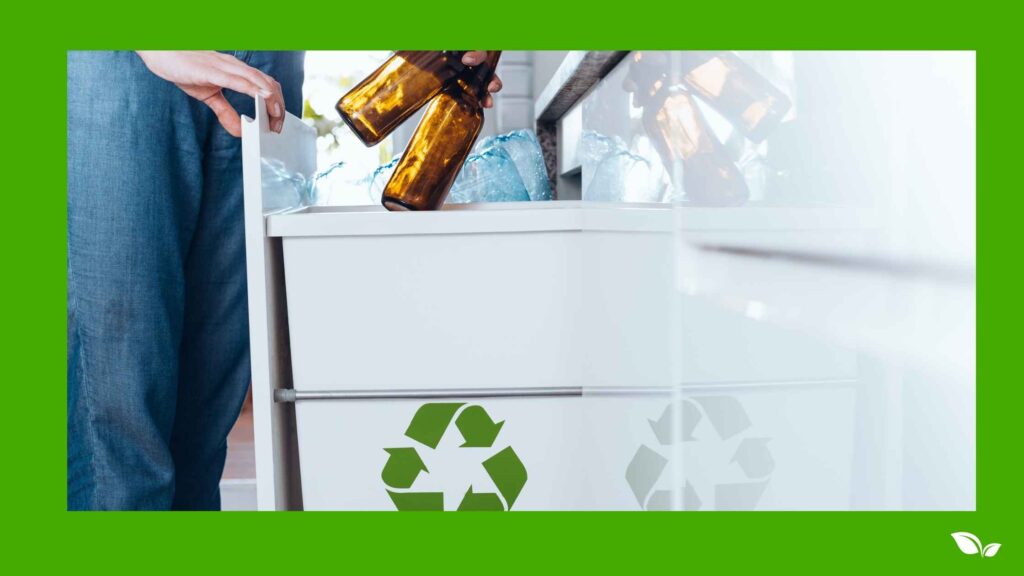
4. Brand Image and Corporate Social Responsibility
Championing environmental responsibility and sustainability by broadcasting your glass recycling efforts can have a great impact on your company’s reputation.
It signals to your customers and stakeholders that your business operates with a sense of purpose beyond just profit (even when these measures do help your margins!)
In an era where sustainability concerns are at the forefront of societal consciousness, companies that actively demonstrate their commitment to environmental responsibility and sustainable practices stand out against competitors.
Did you know that 94% of consumers are likely to be loyal to a brand that offers complete transparency. 80+ Sustainability Statistics for 2025: Ultimate List
A strong sustainability record not only builds a positive brand image but also creates trust between you and your customer base which can lead to better customer loyalty, and more business for you long-term.
5. What Can Go in a Glass Recycling Bin?
All types of glass can go in a glass recycling bin.
The only types of glass that should not be disposed of through your glass waste bin are heat-resistant glass like Pyrex, mirrored glass, and any glass that still has other components attached e.g. lightbulbs.
What Glass is Accepted in Glass Recycling Bins?
There are many types of glass items that are perfectly acceptable for recycling.
Examples of Glass Products that can be Recycled:
- Glass Bottles
- Glass Culinary Ware (e.g. wine glasses, drinking cups, plates etc.)
- Glass Storage & Containers
What Glass is not Accepted in Glass Recycling Bins?
There are a select few types of glass that is not accepted in glass recycling bins.
This is usually because the different types of glass have different melting points, which means when they get to the recycling centre they cannot all be melted down and reused together.
Examples of Glass Products that Cannot be Recycled:
- Mirrors or Mirrored Glass
- Pyrex Glass
- Ceramics
- Lightbulbs (that still contain any of the electrical components including the metal cap)
- Safety Glass
What Happens If I Put the Wrong Glass in My Recycling Bin?
If you put unrecyclable glass into your glass recycling bin then it will contaminate the recycling collection, affecting the entire truck full of collections conducted that day.
Due to the large volumes of waste that enter recycling centres, the standard procedure is to dispose of the entire load of contaminated recycling, even if most of the container is completely recyclable.
Although in some cases you could be disposing of recyclable waste, you mitigate the risk of recycling centres disposing of huge amounts of completely recyclable waste if you do not educate your staff properly.
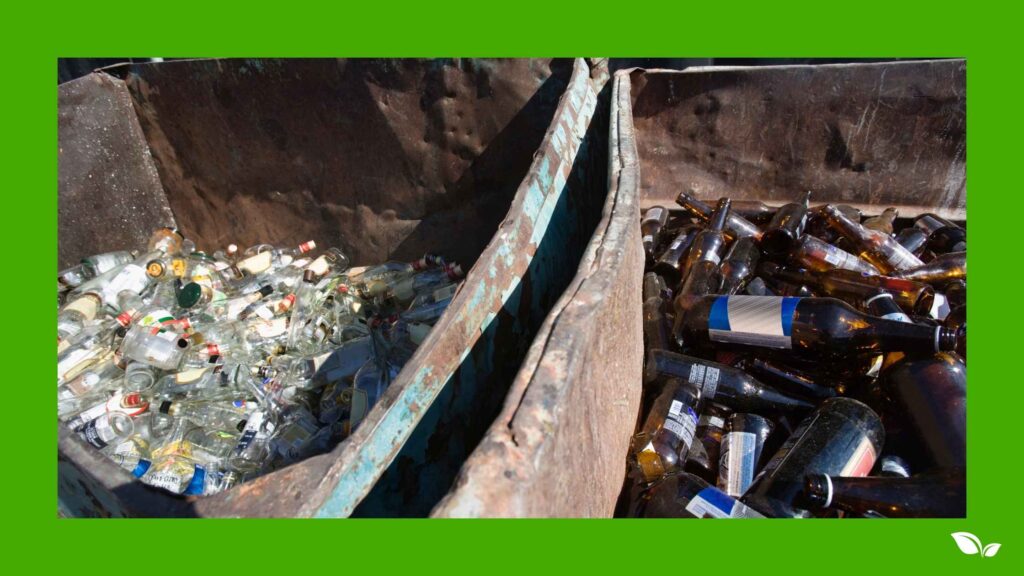
6. How Does Glass Recycling Work?
Glass recycling in the UK works by a seven-step process.
It is a well-established and sustainable process that involves several key steps, from collection and sorting to the transformation of recycled glass into new products.
Glass is 100% recyclable, making it one of the most eco-friendly materials.
However, despite its recyclability, a significant amount of glass is still disposed of improperly, highlighting the importance of efficient recycling practices, particularly for businesses that produce more glass recycling.
Here is a breakdown of how glass is recycled in the UK.
1. Collection & Sorting
The first step in glass recycling in the UK involves the collection of glass waste from various sources.
This is where the glass waste from your business is collected by one of our great waste collectors.
Once collected, the glass is transported to recycling facilities.
At the recycling facility, the glass is sorted based on colour, typically into clear, green, and brown categories.
Sorting is essential as it ensures that recycled glass maintains its colour purity.
2. Cleaning and Contaminant Removal
After sorting, the glass recycling goes through a cleaning process to remove contaminants such as labels, caps, and any remaining food or liquid residues.
This is typically done by subjecting the glass to high-pressure water jets, and sometimes, air or vacuum systems are used to remove smaller contaminants.
3. Crushing and Melting
Once cleaned, the glass is crushed into small pieces known as cullet.
The cullet is then heated in furnaces at extremely high temperatures, typically around 1,700°C (3,092°F).
This melting process turns the cullet into molten glass, which can be moulded into new glass products.
The high temperature helps remove any remaining impurities and ensures the glass is of high quality.
4. Forming New Products
The molten glass is then shaped into new products.
This can include bottles, jars, glass containers, and even fiberglass insulation.
The specific product depends on the desired application.
By using glass recycling to create new items, the demand for raw materials is reduced, which is great for the environment and helps contribute to a circular economy.
5. Quality Control
Throughout the recycling process, there is a strong emphasis on quality control.
The glass is constantly monitored and tested to ensure that it meets industry standards for strength, colour, and purity.
Any glass that does not meet these standards may be recycled again or discarded.
6. Distribution and Use
Once the recycled glass is transformed into new products, it is distributed for various purposes.
Recycled glass containers, for example, can be filled with beverages or food products and distributed to consumers.
Fiberglass insulation made from recycled glass can be used in construction.
7. Repeat the Cycle
The recycling process is cyclical.
Glass can be recycled indefinitely without losing its quality or purity, making it one of the most sustainable materials available.
By participating in the recycling process, individuals and businesses in the UK contribute to conserving natural resources, reducing energy consumption, and minimising environmental impacts associated with glass production.
In summary, glass recycling in the UK not only conserves resources, but also reduces energy consumption and environmental impacts associated with glass production, making it an environmentally responsible practice.

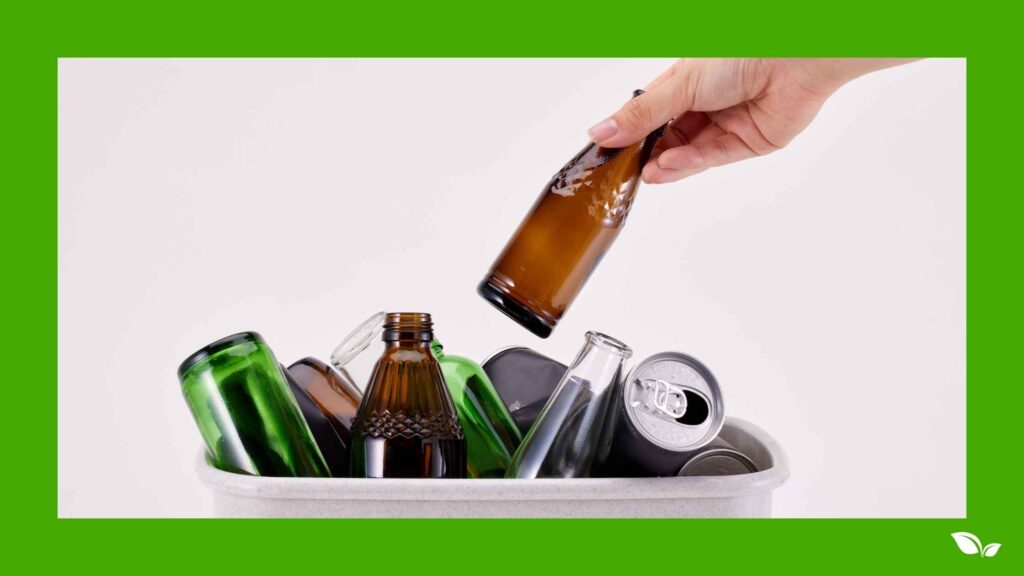
7. What is the Commercial Glass Waste Collection Process?
The commercial glass waste collection process is a 4-step operation.
When you partner with us as your Waste Broker, and we will make glass recycling collection process as easy as possible for you, taking all the hassle out of your commercial glass waste collection.
How does glass recycling collection work, and what are the next steps?
1) Choose Your Bins
At Waste Basics, we make arranging your commercial glass recycling collection as straightforward and efficient as possible.
We recognise your need for the best service possible at the lowest prices, and we are here to assist you in achieving just that.
2) Arrange Delivery of Your Bins
We will work collaboratively with you to determine the most convenient delivery schedule for you and address any potential issues in advance such as locked gates or secured areas.
Relax with the knowledge that we have your glass recycling needs covered.
We are dedicated to ensuring your experience is as easy as possible, ensuring quick collection of your commercial recycling waste and the best experience every time.
3) Fill Up Your Bins
Once your new bins have been delivered to your business address, you can go ahead and fill them with your glass recycling waste, or any of the other waste streams you may have gone for.
4) Get Your Glass Recycling Collected
We will set out a schedule that suits you and your business needs, entirely based on the type and amount of waste you produce.
At Waste Basics, we keep recycling simple, transparent, and affordable. Get your free quote today and see how much you could save.
![Glass_bin_with_glasses[1]](https://wastebasics.co.uk/wp-content/uploads/2023/09/Glass_bin_with_glasses1-2240x1120.jpg)





